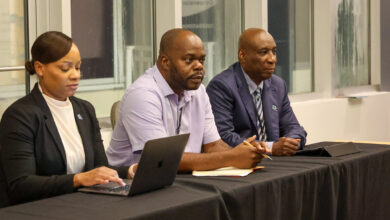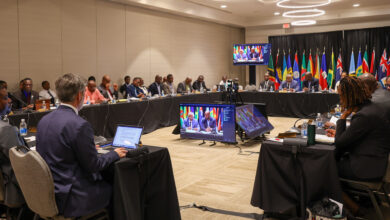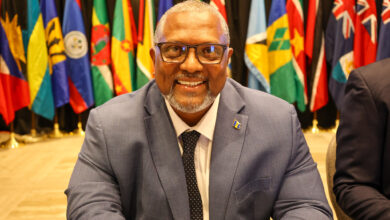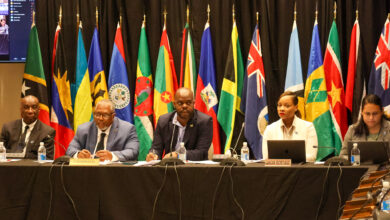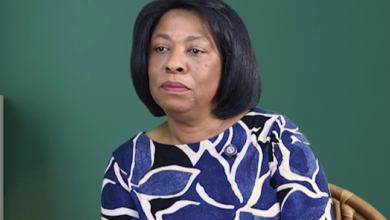Salutations
It is with great honour that I take on the responsibility of chairing this Twenty Third Meeting of the CARICOM Council for Trade and Economic Development. Among the Councils of the Community, the COTED is arguably where the centre of gravity for the Community can be found. It is as they say where all the action happens. Within this body we deal with the backbone and foundational issues of our regional integration project. While the other Councils are certainly no less important within the Community’s structure all issues must lead off from or lead back to the COTED at one point or another on their way to the Conference.
Although this time around our Meeting is scheduled for one day, I will try very hard to complete our work in the allotted time. We do have a rather full agenda. I am hoping nonetheless that we can move through most of the issues with some dispatch. As usual, our officials have done a commendable job of preparation on all the agenda items and have given us recommendations that we can readily adopt.
Colleague Ministers:
If the COTED is going to fulfil its function and mandate as stated in the Revised Treaty then it is important that we deal with the matters which come before us with deliberate decisiveness and finality that should be expected. When matters are brought before this body and they are deliberated upon and the necessary decisions are taken, these decisions need to be implemented. In that way the matter is dealt with once and for all.
One sure way of knowing that the matter has been dealt with one way or another is its removal from the agenda of future meetings of the Council. Too many issues however seem to be perennially returning to the agenda of the COTED meeting after meeting. For many of these matters explicit decisions have been made requiring specific action to be taken by Member States. When these matters return to the agenda unaltered it means that to a greater or lesser extent we have not fulfilled our obligations. I would therefore like to urge all of us colleagues as we go through the agenda today let us identify those issues that we have gone over in the past and commit ourselves to dealing with them in the shortest possible time frame. I am certain the Secretariat stands ready to offer assistance to Member States where this is needed.
One item which has engaged the attention of the COTED for a long time since 2002 is the implementation of obligations under the programme for the removal of restrictions for the creation of the single market. In January and July 2006 the single market was declared to be in operation in all our jurisdictions. While the market access aspects of the Single Market are largely completed there still remain measures to be taken to remove legal restrictions on the rights confirmed on CARICOM nationals by the Treaty. There are also procedures that we need to finalise and implement to enable persons to exercise their rights under the Treaty.
Colleagues:
Our public declaration of CSME readiness and the various public education and awareness campaigns have created a high level of expectation among our nationals. It is therefore imperative that we bring to finality the creation of the single market so that we may reap the expected benefits. I am not only speaking of our individual Member State obligations which need to be fulfilled. I am also speaking of our collective Community obligations that are necessary to ensure that all the expected benefits are equally shared and distributed among all.
One indicator of how well the benefits of the single market process are being shared and distributed among all Member States will be found in the performance on intra-regional trade in goods. We will be receiving a report for the 2004 – 2005 period, during the course of this Meeting. While trade in goods represents only part of the picture, and needs to be supplemented by trade in services data, it does give an indication of how we are progressing.
The LDCs, and particularly the OECS, have continued to experience negative performance in the balance of intra-regional trade. A quick look at the report shows that in 2005 the negative balance for the OECS reached EC$846 million, an increased negative balance of $206 million over the $640 million negative balance in 2004. While recognising that there is missing data for Antigua and Barbuda for 2004, there is still a trend that the OECS continues to suffer a growing negative balance of trade in goods within the Region. It is critically important therefore for data on intra-regional trade in services to be compiled and analysed to determine whether that imbalance in trade in goods is compounded by a negative balance in trade in services.
On the issues of our external trade relations, there too we find difficult matters that have remained unresolved and on the agenda for consecutive meetings of the COTED. We have not been able to fully activate and implement the agreements signed with the Dominican Republic and Cuba. We need to move forward and make progress in the implementation of those agreements. We have initiated a process that would lead to the signing of new trade agreements with the Central American countries. This is going to pose increased demands on our limited resources and capacity, whether it be time, financial and/or human. However establishing these external links is a critical part of the current international economic environment in which we are operating.
Colleagues,
I began by suggesting that the work of this Council encapsulates the fundamentals of the highest goals and objectives that we have set for the Community and the CSME. I would like to encourage us to discharge our responsibilities with the urgency and due diligence that is required.
I thank you.

